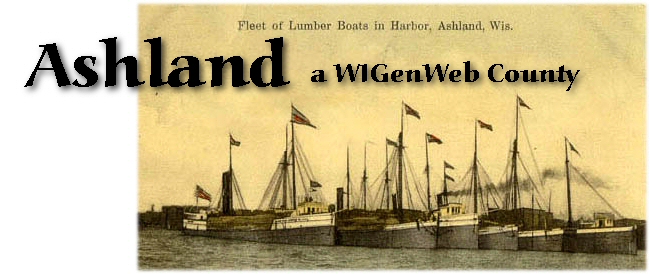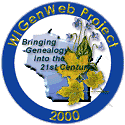
 |
|
Early Life Among the Indians |
|
A Murder Trial at Yellow Lake - Yet a Mystery - Collar and Sleeve Buttons of the Murdered Man - An Introduction to the Bear Family In 1855 a man name McEwen came to me at La Pointe who told me he was from California formerly, but was then located at St. Paul; that he had been prospecting through this part of the country or some time for the purpose of finding a suitable location for business and to buy real estate but as the weather was becoming unfavorable for this work he had resolved to return to St. Paul and wanted to know if I could furnish a couple of good reliable men to pilot him as far as Yellow Lake, for when once there he could get on alone over old lumber roads to St. Paul. I furnished him with two half breeds by the name of Gostelang, their first names being Belamy and Batese, and it transpired they did their duty and left McEwen at Yellow Lake all right, at a stopping place kept by Joseph Cobaux (or Cavillion), and that McEwen remained at this place two nights and a day. I further ascertained that Cobaux advised McEwen not to follow the tote road as he had intended but to go by trail to Clam Lake and from there to Wood Lake, as it would shorten the distance some ten or twelve miles and that he would send a man with him as a pilot until he should again come to the tote road, which he would do at a place called Knute Andersons's Meadow. Subsequent events show that McEwen took this advice but he was never again seen alive by his friends. It seems that McEwen had written to a partner in St. Paul prior to his departure that he would arrive there about a certain time, and that his partner had become anxious about him after the time had expired. He wrote to me I answered him telling all I could, which was his start and arrival at Yellow Lake. In a short after this friend of McEwen's whose name I cannot remember, came to La Pointe to ferret out the mystery. I gave him what information I could and he set out, promising to let me know from Yellow Lake what success he was having. He did so, saying that McEwen had arrived at Yellow Lake and remained there two nights and the men that I had sent returned the next morning. I then sent two men to Yellow Lake, who talk both English and Chippewa, and instructed them to talk with whites and Indians and get all the information they could and the route he had taken and follow it and find out if possible what became of the man. They ascertained at Yellow Lake from the Indians that Cobaux had sent a man with him by way of the Clam Lake Trail. The men followed. At Clam Lake they found where they had a fire and cooked a meal. The next sign they found was at Wood Lake where they had occupied an old lumber camp. Here they found blood stains but a thorough search of the camp only revealed a tin box which McEwen had carried his papers and minutes of land descriptions. The streams and lakes were now frozen over and snow had fallen and further search had to be abandoned until spring. A search was instituted then which resulted in finding his body in a little lake at the head of Wood Lake proper. The head had been cut with an axe or hatchet on the back part of it. Nothing by which he could be identified was left except his clothing. His collar button and shirt studs and a valuable finger ring, which he told me were made of gold he had dug himself, were missing. I do not think that McEwen had any money about him except what he might have had left from ten dollars he borrowed from me. The collar button and shirt studs, or similar ones, were afterward seen in a shirt worn by a trader at St. Croix Falls, but there being no one who could identify them to a certainty, we were compelled to be satisfied with our own conclusions, but from what we had seen of them and what he had said of them, we were more than satisfied that they were the property of Mr. McEwen. In the spring of 1841 my first real good introduction to the bear family took place. It was in the logging camp of Mr. Page and less than one mile from the present city of Hudson, Wisconsin. The camp had been pretty well cleared out of its supplies, they having been moved down to the place where the drive would begin. Only a few papers, scaler's rule and time book and a keg part full of molasses were left behind. One afternoon after the landing had been broken and booming about complete, Mr. Page requested me to take a man and go to the camp and return in the morning, bringing the rule and papers and have the man bring along the keg of molasses. I took a young Indian about twenty years of age named Wa-sa-je-zik, and started for the camp. It was nearly dark when we started and we had a mile to walk over a muddy trail. The boy stripped some birch bark from an old wigwam near the road and made a torch to use as a light when we reached the shanty. When near the he handed me the torch and picked up the wood to make a fire. I lit the torch at the cabin and found the door partly open but went in followed by the boy who closed the door as he came through and dashed his armful of wood down at the fire place. At this we heard a rush along side the camp at our left that nearly scared the life out of us and raising the torch we beheld two bears, who had doubtless been attracted to the cabin by the scent of the molasses. They made a rush for the door where they entered but it was closed and wheeling about they faced us, their eyes shining with a luster that we would much rather have seen in a painting. But we were there; no door but the one the bears were guarding and no window where we could escape. We stood like statues for awhile eyeing our companions, while the torch was fast burning away. The roof was made of shakes and the eaves were about 4 feet from the ground. Escape we must or we would soon be in the dark with our black companions. We expected any moment to be pounced upon, for every spring bears, as a usual thing, are very hungry. It occurred to me that perhaps I could move the shakes enough to crawl through and handing the now shortened torch to the boy and at the same time instructing him to keep it waving to hold the bruins at bay, I made a dash for the shakes and soon had a hole through which I could crawl and did and shouted to Wa-sa-je-zik to come. The lad went through that hole like and arrow, and he was none to quick, for one of the bears espied the light of the Heavens through the hole I made and dashed for it, but missed his footing and fell back. By this time we had the shake kicked back into place and Messrs. Bruins were our prisoners. We camped outside that night and in the morning got a rifle and killed them both. We took the hides and best of the meat to the boys on the drive had a regular powwow and feast to celebrate our adventure. I had several experiences with bear after this, but never again was caught in their den. A black bear is harmless except when wounded or cornered and then they are a wicked foe. I once wounded one and we had a lively promenade around an old pine stub until I got my hunting hatchet from my belt and dealt him several blows when he gave up the fight and we had no quarrel over gate receipts. He started away uttering a growl. I picked up my gun and finished loading it and soon had his hid as a trophy. I did not meet Wa-sa-je-zik again until two or three years ago at Granite Falls on the Mississippi. He recognized me at once and began to relate the story and it seemed like meeting a long lost brother, when our encounter with the bears had been revived.
Contributed and used with permission on this site by Timm Severud. The Lac Courte Oreilles Historical Preservation Office created this reproduction.Timm Severud manually typed it in and some minor changes to text have been made from the original, to correct spelling mistakes, and slight grammar mistakes. There is no copyright on this book or this reproduction. Feel free to use and share with others. Enjoy what I consider the best historical biography I have ever read. T.L.S. |
Last Update Monday, 07-May-2018 17:23:36 CDT
 |
WIGenWeb State Coordinator:
Tina Vickery WIGenWeb Assistante State Coordinator: Marcia Ann Kuehl Copyright 2010 by the WIGenWeb Team. All rights reserved. Copyright of submitted items belongs to those responsible for their authorship or creation unless otherwise assigned. |
 |